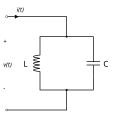LC circuit
An LC circuit is an electronic circuit made up of an inductor and a capacitor.
LC circuit's resonant frequency is equal to: [math]\displaystyle{ \omega=\sqrt{1\over LC} }[/math]
The angular frequency ω has units of radians per second.
LC circuits are used for creating signals at a particular frequency, or picking out a signal at a particular frequency from a more complex signal. An ideal LC circuit does not have resistance.
At LC circuit energy saves in the capacitor's electric field.
[math]\displaystyle{ {U}={q^2\over2C} }[/math]
U is energy and q is electric charge. At LC circuit energy also save in the inductor's magnetic field.
[math]\displaystyle{ {U}={Li^2\over2} }[/math]
U is energy and i is electric current that flows in inductor.
Let's analyze an LC circuit's vibration. Vibrating LC circuit's total energy is U.
[math]\displaystyle{ U={q^2\over2C}+{Li^2\over2} }[/math]
Because circuit's resistance is 0, there is no energy that transmits to heat energy, and U is maintained regularity. [math]\displaystyle{ {dU\over dt} = 0 }[/math]
So LC circuit's vibration is shown like that [math]\displaystyle{ {Ld^2q\over dt^2}+{q\over C}=0 }[/math]
First consider the Electrical impedance of the series LC circuit. The total impedance is given by the sum of the inductive and capacitive impedances
[math]\displaystyle{ Z = Z_{L} + Z_{C} }[/math]
By writing the inductive impedance as [math]\displaystyle{ Z_{L} = j \omega L }[/math] and capacitive impedance as [math]\displaystyle{ Z_{C} = \frac{1}{j{\omega C}} }[/math]
- [math]\displaystyle{ Z = j \omega L + \frac{1}{j{\omega C}} }[/math] .
Resultingly the series connected circuit, when connected to a circuit in series, will act as a band-pass filter having zero impedance at the resonant frequency of the LC circuits.
The same analysis may be applied to the parallel LC circuit. The total impedance is then given by
[math]\displaystyle{ Z=\frac{Z_{L}Z_{C}}{Z_{L}+Z_{C}} }[/math]
and after substitution of [math]\displaystyle{ Z_{L} }[/math] and [math]\displaystyle{ Z_{C} }[/math] we have
[math]\displaystyle{ Z=\frac{\frac{L}{C}}{\frac{(\omega^{2}LC-1)j}{\omega C}} }[/math]
which simplifies to
[math]\displaystyle{ Z=\frac{-L\omega j}{\omega^{2}LC-1} }[/math] .
Resultingly the parallel connected circuit will act as band-stop filter having infinite impedance at the resonant frequency of the LC circuit.
LC Circuit Media
Output tuned circuit of shortwave radio transmitter from 1938
LC circuit (left) consisting of ferrite coil and capacitor used as a tuned circuit in the receiver for a radio clock





